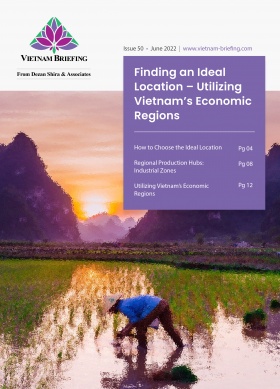Vietnam Approves National Strategy on Foreign Investment: Decision 667
Vietnam issued Decision 667 approving the foreign investment cooperation strategy for the 2021-2030 period on reforming the business environment and increasing foreign investment from certain countries. The government, therefore, is making efforts to improve foreign investment in both quantity and quality, especially in high-tech and digital economy sectors. Here, Vietnam Briefing highlights the key takeaways that investors should be aware of as the country launches a new strategy for foreign investment cooperation.
On June 2, Deputy Prime Minister Pham Binh Minh signed Decision No. 667/QD-TTg (Decision 667) approving a National Strategy for foreign investment cooperation for the 2021-2030 period. FDI inflows into the country continue to make great momentum with US$14 billion arriving in the country in the first half of 2022.
Highlights of the Strategy
The strategy targets to increase the share of registered foreign investment capital from Asia, Europe, and the US so that the capital placed by them represents more than 70 percent of the total disbursed in Vietnam by 2025 and 75 percent by 2030.
These countries include top investors such as Singapore, South Korea, Japan, China, Taiwan, as well as Malaysia, Thailand, India, Indonesia, and the Philippines. The strategy also aims to boost investment from EU partners such as France, Germany, Italy, Spain, Russia, the UK, and the U
Another objective mentioned in Decision 667 is to place the country in ASEAN’s top three and the world’s top 60 in terms of the business environment, as per the World Bank classification.
Nine solutions to leverage foreign investment cooperation
The strategy puts forward nine specific solutions:
- Implement the issued solutions effectively.
- Improve the business investment environment, and improve the economy’s quality, efficiency, and competitiveness.
- Developing an ecosystem of science, technology, and innovation.
- Innovating and enhancing competition in attracting foreign investment.
- Developing supporting industries, promoting linkages, and spreading.
- Promote internal capacity and take advantage of competitive advantages to improve the efficiency of foreign investment cooperation.
- Improve the efficiency of international economic integration and Vietnam’s position in the international arena.
- Modernize and diversify investment promotion.
- Improve the effectiveness and efficiency of state management of the foreign investment.
The most notable of which, however, can be summarized as follows:
- Develop the country’s innovation ecosystems: to speed up the implementation of the Resolution 52/NQ-CP issued in 2020 by the government on how the country shall approach the Industry 4.0 Revolution; to introduce incentives for cooperation and technology transfers; to complete the legal framework on the establishment, protection, and commercialization of intellectual property (IP) rights in scientific, technological and creative activities.
- Foster supporting industries: to continue to improve the legal environment for technology transfers by building a synchronous document system; to promote the formation and development of intermediary organizations; to facilitate the forming of joint ventures and linkages between foreign-invested enterprises and domestic research institutes and universities.
Takeaways
The national ten-year strategy aims to better its business environment regarding the policies and supporting infrastructure and develop a strong domestic business sector with maximum support for start-ups while having an outlook for further high-tech implications across sectors. This generally means the government is trying to make Vietnam an even more attractive investment destination for foreign capital.
And that promises a set of new regulations, policies, and investment incentives from the government to allure a greater amount of foreign investment in the foreseeable future, especially in the country’s current prioritized areas like the high-tech sectors.
The strategy, meanwhile, also demands national ministries and departments to accelerate the address of other lingering problems to the country’s competitiveness like institutional reforms or the state management of Intellectual Property, which will all contribute to promoting the developments of the economy, culture, and society of the country.
About Us
Vietnam Briefing is produced by Dezan Shira & Associates. The firm assists foreign investors throughout Asia from offices across the world, including in Hanoi, Ho Chi Minh City, and Da Nang. Readers may write to vietnam@dezshira.com for more support on doing business in Vietnam.
We also maintain offices or have alliance partners assisting foreign investors in Indonesia, India, Singapore, The Philippines, Malaysia, Thailand, Italy, Germany, and the United States, in addition to practices in Bangladesh and Russia.
- Previous Article Why Your Market Entry Strategy Matters in Vietnam?
- Next Article US Exempts Tariffs on Vietnamese Solar Panels for 2 Years: What to Expect






